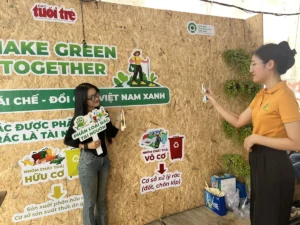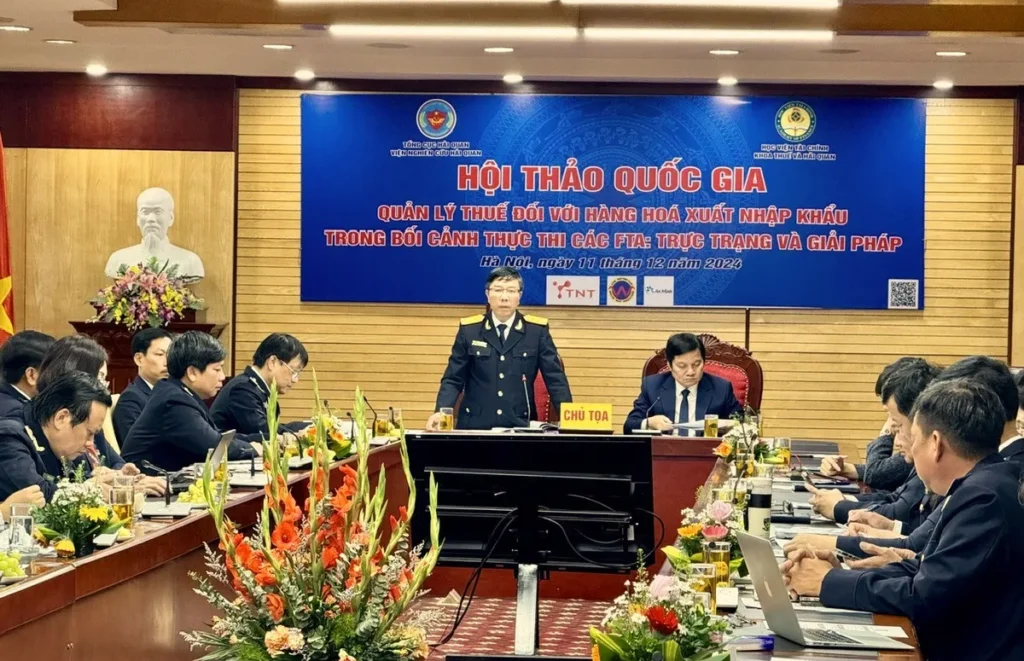Participating in FTAs will help businesses access cheap goods, advanced technology, and necessary input factors from developed countries.
Economist, Dr. Nguyen Dinh Chien emphasized at the National Workshop to discuss the current situation and solutions for tax management of import and export goods in the context of implementing FTAs taking place on December 11.
FTA supports strong export growth
Actively negotiating and signing FTAs in recent times has helped Vietnam improve its economic and trade relations with other countries, thereby attracting more interest and attention from foreign investors to the Vietnamese market, opening up prospects for investment and business cooperation between Vietnam and foreign investors. In addition, the commitments in FTAs also include provisions directly related to opening up the service market, investment and policies for foreign investors. In addition, Vietnam’s increasingly expanding investment fields and the contents of the rules of origin in FTAs also create attractiveness to attract investment from FTA partner countries to Vietnam.
According to information from the General Department of Customs, to date, Vietnam has signed 19 bilateral and multilateral free trade agreements (FTAs) with most countries and territories in the world. These include all developed countries, emerging economies and countries in the region such as: AFTA, ACFTA, AKFTA, AJCEP, CPTPP, UKVFTA, RCEP, EVFTA… especially new generation FTAs such as CPTPP, EVFTA and RCEP. According to experts, new generation FTAs are a breakthrough development of free trade agreements, surpassing the limits of traditional FTAs in both the scope of commitments and the level of implementation requirements.
“In reality, the implementation of FTAs in recent times has had a positive impact on our export and import turnover and achieved rapid growth,” Associate Professor, Dr. Nguyen Manh Thieu (Academy of Finance) assessed.
According to statistics, the total import and export turnover of Vietnam from 2002 – 2012 was 1,036 billion USD, then in the period from 2013 – 2021 it was 4,110 billion USD, which is 4 times higher than the previous 10 years.
Previously, in 2023, the export and import turnover reached 681.1 billion USD, which is 6 times higher than the annual average of the period 2002 – 2012 and increased by about 50% compared to the annual average of the period 2013 – 2021. The total export turnover from the beginning of the year to November 15, 2024 was 681.14 billion USD, an increase of 15.7% over the same period in 2023 and exceeding the total export and import turnover of 2023.
According to economic experts, participating in FTAs will help domestic enterprises have the opportunity to access cheap goods, advanced technology, necessary input factors for production and business activities such as machinery, equipment, tools, spare parts and raw materials… from developed countries with good quality. “Through this, enterprises will improve labor productivity, product quality, enhance competitiveness, strongly promote the export of goods to international markets and especially participate more effectively in the global supply chain”, said Dr. Nguyen Dinh Chien.
Many opportunities and challenges for management agencies and businesses
According to experts, the new generation FTA has brought many opportunities for intra-industry trade and tax administration in Vietnam. Taking advantage of these opportunities requires a flexible and effective tax administration strategy, while overcoming existing challenges to ensure sustainable development in the context of global integration.
Notably, we have witnessed the diversification of trade types and export and import goods. In particular, the explosion of e-commerce with thousands of e-commerce platforms has increased the volume of small value export and import orders at an extremely large level in recent years. Just counting the goods imported from China to Vietnam via e-commerce platforms, each day there are an average of 4 – 5 million small value orders.
“The development of e-commerce is creating huge pressure and challenges, requiring comprehensive innovation in tax management activities for exported and imported goods, both in terms of management methods, management technology and people performing tax management tasks,” Mr. Thieu commented.
Therefore, in order to seize opportunities and limit difficulties for the Vietnamese economy in general, import-export activities and tax management for import-export goods in particular, it is necessary to clearly identify the opportunities and challenges posed by the implementation of FTAs. At the same time, State management agencies as well as the business community need to have necessary solutions so that Vietnam can better utilize the advantages of FTAs in economic development, improve competitiveness, promote import and export of goods as well as further improve the effectiveness of tax management for import and export goods in the coming time.
Solving the problem for businesses, experts also said that promoting production and business, improving the competitiveness of Vietnamese enterprises is also urgent. Because, when implementing FTAs, with requirements on quality, production technology towards sustainable development, domestic enterprises are required to constantly improve production processes, improve product quality, and meet the requirements of large and demanding markets in FTA partners. “Domestic enterprises need to quickly innovate technological processes, improve labor productivity, product quality and competitiveness”, Dr. Nguyen Dinh Chien affirmed./.
















